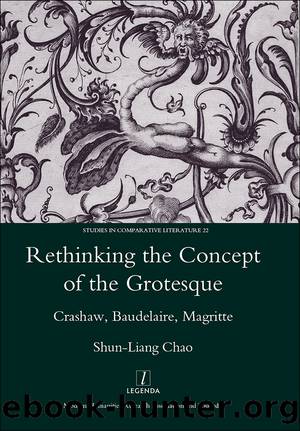Rethinking the Concept of the Grotesque by Chao Shun-Liang;

Author:Chao, Shun-Liang;
Language: eng
Format: epub
Publisher: Taylor and Francis
Published: 2010-09-15T00:00:00+00:00
Here Crashaw directs us first to envision Christ as a son sucking his own mother’s teats and then as ‘a monstrous hermaphrodite deity’:118 the wound of Christ’s side transforms into a breast, and the spear that pierced his side turns into a long bloody teat that suckles the Mother, or really, all mothers.
In all the above catachrestic pseudometaphors, grotesque images involve bleeding wounds mixed with soft or tender materials such as tears and milk not only to activate our visual and gustatory sensations but also to heighten emotional intensity; in this way, we savour the blood of God and therefore, to quote St. Cyprian, ‘both outwardly and inwardly we are made red thereby’. In other words, such imagistic grotesqueness terrifies the reader by triggering his/her vicarious participation in the pain and death of suffering Christ and yet delights him/her because, thanks to Christ’s blood, s/he is under the aegis of divine grace. Grotesque metamorphoses caused by catachreses or flesh-made pseudometaphors can be seen as Crashaw’s imaginative extension of the Catholic doctrine of transubstantiation, which carries with it, to quote Clark Hulse on metamorphic metaphors, ‘the [divine] ecstasy or terror of the flesh made free to move across the categories of substance, and of the mind to move across the categories of thought’.119 It is, so to speak, through corporeal metamorphoses — which appear at the literal level of metaphors — that the mind savours divine terror or awe. And Crashaw, as we have seen, semioticizes the normal, or symbolic, function of metaphor — that of engendering a (strong) figurative sense — and thereby coerces the mind’s eye to linger on corporeal metamorphoses.
* * * * *
In his Sacred Poetry of the Seventeenth Century (1835), one of the first anthologies of English religious poetry, Richard Cattermole writes: ‘Crashaw is a genuine and glowing poet: he is equally at home in the playful and the terrible, and throws an equal interest over the familiar and the sublime’.120 If so, it is Crashaw’s flesh-made pseudometaphors that best illustrate such dissonant qualities (which, as we shall see in the following chapter, speak to the Romantic taste). Crashaw sensualizes and semioticizes his devotional pseudometaphors in such a way as to force the mind’s eye to dwell on the vivid images of corporeal trans-formation that shock the mind into an emotional/carnal knowledge of divine death or pain which carries with it the joy of divine grace. In these pseudometaphors, Catholic visual piety, as we have seen, collaborates with the Longinian visualization and the Baroque imagination to evoke the most energetic devotional grotesque images in the Baroque Age.
Download
This site does not store any files on its server. We only index and link to content provided by other sites. Please contact the content providers to delete copyright contents if any and email us, we'll remove relevant links or contents immediately.
The Power of Myth by Joseph Campbell & Bill Moyers(1049)
Half Moon Bay by Jonathan Kellerman & Jesse Kellerman(979)
Inseparable by Emma Donoghue(976)
A Social History of the Media by Peter Burke & Peter Burke(968)
The Nets of Modernism: Henry James, Virginia Woolf, James Joyce, and Sigmund Freud by Maud Ellmann(890)
The Spike by Mark Humphries;(805)
The Complete Correspondence 1928-1940 by Theodor W. Adorno & Walter Benjamin(773)
A Theory of Narrative Drawing by Simon Grennan(773)
Culture by Terry Eagleton(770)
Ideology by Eagleton Terry;(731)
World Philology by(711)
Farnsworth's Classical English Rhetoric by Ward Farnsworth(710)
Bodies from the Library 3 by Tony Medawar(707)
Game of Thrones and Philosophy by William Irwin(707)
High Albania by M. Edith Durham(697)
Adam Smith by Jonathan Conlin(685)
A Reader’s Companion to J. D. Salinger’s The Catcher in the Rye by Peter Beidler(675)
Comic Genius: Portraits of Funny People by(648)
Monkey King by Wu Cheng'en(645)
